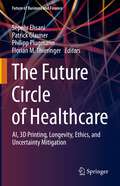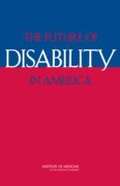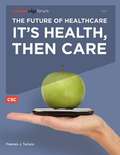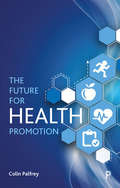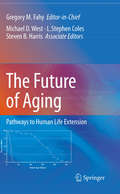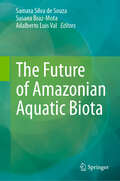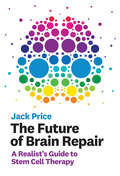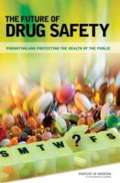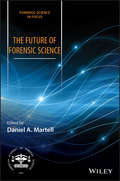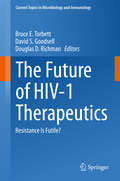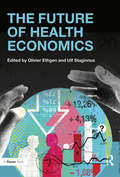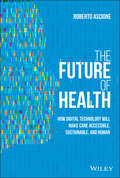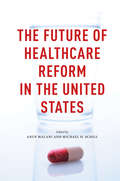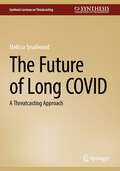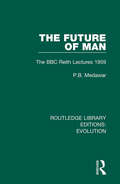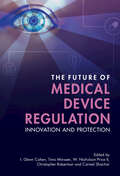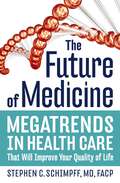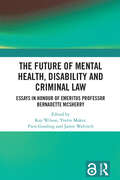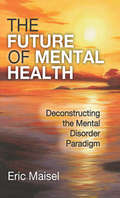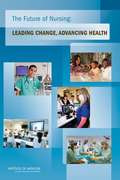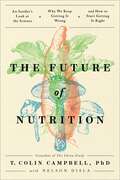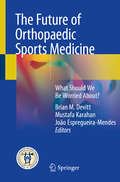- Table View
- List View
The Future Circle of Healthcare: AI, 3D Printing, Longevity, Ethics, and Uncertainty Mitigation (Future of Business and Finance)
by Philipp Plugmann Patrick Glauner Sepehr Ehsani Florian M. ThieringerThe past decade has brought to the fore the critical need to constantly envision and consider various scenarios where ongoing trends and sudden changes could together alter the provision of healthcare and the direction of medical research. This book brings together scholars whose areas of expertise represent different themes that are essential to understanding how healthcare might change and evolve over the next decade. What lessons can one take away from current and past developments? The themes explored by the book rest on four pillars. The first is the rapid pace and ubiquity of technological advances in areas such as artificial intelligence, machine learning, additive manufacturing and wearable electronics. The second pillar concerns healthy aging, longevity and the management of chronic diseases. The third is the imperative to remain cognizant of the ethical dimensions of medical decisions, adapting bioethics to ongoing changes in healthcare provision. Finally, the fourth pillar relates to how uncertainty in different domains of medical knowledge can be mitigated and translated into clinical practice. For example, how should uncertainty with the results of clinical trials for a new treatment be dealt with? What cost-benefit analyses would be most appropriate for the situation? Chapter authors identify respective challenges and promising opportunities, discussing how these could contribute to envisioning the future scope of healthcare when it comes to providing medical, economic and ethical values to human societies.Chapters 1, 4, 12, and 20 are available open access under a Creative Commons Attribution 4.0 International License via link.springer.com.
The Future Of Disability In America
by Institute of Medicine of the National AcademiesThe future of disability in America will depend on how well the U.S. prepares for and manages the demographic, fiscal, and technological developments that will unfold during the next two to three decades. Building upon two prior studies from the Institute of Medicine (the 1991 Institute of Medicine's report Disability in America and the 1997 report Enabling America), The Future of Disability in America examines both progress and concerns about continuing barriers that limit the independence, productivity, and participation in community life of people with disabilities. This book offers a comprehensive look at a wide range of issues, including the prevalence of disability across the lifespan; disability trends the role of assistive technology; barriers posed by health care and other facilities with inaccessible buildings, equipment, and information formats; the needs of young people moving from pediatric to adult health care and of adults experiencing premature aging and secondary health problems; selected issues in health care financing (e.g., risk adjusting payments to health plans, coverage of assistive technology); and the organizing and financing of disability-related research. The Future of Disability in America is an assessment of both principles and scientific evidence for disability policies and services. This book's recommendations propose steps to eliminate barriers and strengthen the evidence base for future public and private actions to reduce the impact of disability on individuals, families, and society.
The Future Of Healthcare: It's Health, Then Care
by Frances J. TuriscoHealthcare is ripe for disruptive innovation. CSC takes a holistic view of healthcare, with the patient at the center, and identifies 5 trends that will re-shape the industry. Healthcare is moving from a care-first to a wellness-first perspective via the efforts and technologies in these trends: E-Power to the Patient - Patients take on a larger, more active role in managing their wellness and health. Earlier Detection - Earlier detection maximizes options for successful treatment, leading to a speedier return to good health. High-Tech Healing - New technologies can significantly boost outcomes and quality of life. Resources: More, but Different - Solving the healthcare resource puzzle requires new players and new care models. Global Healthcare Ecosystem Emerges - More information, more connected, leads to better care and better research. This report targets patients, providers, healthcare businesses, technology companies and industry gurus. Learn how you can be part of the change.
The Future for Health Promotion
by Colin PalfreyDoes health promotion have a lasting and positive effect on people? With mounting pressure to reduce costs to the NHS and increasing scepticism of the so-called nanny state, health promotion initiatives are increasingly being criticised as costly and ineffective, with many arguing that health inequalities can only be reduced through radical political and economic change. This book examines the methods used to evaluate the value of health promotion projects and determines whether attempts to change people’s lifestyles have proved successful. Taking into account the practical and ethical issues involved in deciding the appropriate approach to take in efforts to reduce health inequalities, the book assesses what might be the best path forward for health promotion.
The Future of Aging
by Gregory M. Fahy L. Steven Coles Michael D West Stephen B. HarrisJust as the health costs of aging threaten to bankrupt developed countries, this book makes the scientific case that a biological "bailout" could be on the way, and that human aging can be different in the future than it is today. Here 40 authors argue how our improving understanding of the biology of aging and selected technologies should enable the successful use of many different and complementary methods for ameliorating aging, and why such interventions are appropriate based on our current historical, anthropological, philosophical, ethical, evolutionary, and biological context. Challenging concepts are presented together with in-depth reviews and paradigm-breaking proposals that collectively illustrate the potential for changing aging as never before. The proposals extend from today to a future many decades from now in which the control of aging may become effectively complete. Examples include sirtuin-modulating pills, new concepts for attacking cardiovascular disease and cancer, mitochondrial rejuvenation, stem cell therapies and regeneration, tissue reconstruction, telomere maintenance, prevention of immunosenescence, extracellular rejuvenation, artificial DNA repair, and full deployment of nanotechnology. The Future of Aging will make you think about aging differently and is a challenge to all of us to open our eyes to the future therapeutic potential of biogerontology.
The Future of Amazonian Aquatic Biota
by Samara Silva de Souza Susana Braz-Mota Adalberto Luis ValThe aquatic habitats of the Amazon region are subject to natural daily and seasonal variations in the physico-chemical properties of the water. The organisms that inhabit these habitats have developed adaptations to cope with these natural events. However, human-induced environmental changes are threatening ecosystems and affecting biodiversity at all levels of biological organization by causing drastic changes in climatic conditions in a shorter period of time, without giving organisms time to adapt. In this sense, the book addresses the future of aquatic organisms in the Amazon, including bacterial symbionts, insects, crustaceans, fish, plants, and amphibians, and provides an overview of what the future of biodiversity in the Amazon will look like, both in terms of organisms' adaptations to natural changes and in terms of vulnerability and responses to human impacts, highlighting possible mechanisms to minimize the expected impacts. The book also provides a brief overview of the risks that climate change poses to livestock, strategies for the sustainable use of species in the Amazon region and the impact of climate change on fish diseases.
The Future of Brain Repair: A Realist's Guide to Stem Cell Therapy (The\mit Press Ser.)
by Jack PriceA scientist assesses the potential of stem cell therapies for treating such brain disorders as stroke, Alzheimer's disease, and Parkinson's disease.Stem cell therapies are the subject of enormous hype, endowed by the media with almost magical qualities and imagined by the public to bring about miracle cures. Stem cells have the potential to generate new cells of different types, and have been shown to do so in certain cases. Could stem cell transplants repair the damaged brain? In this book, neurobiologist Jack Price assesses the potential of stem cell therapies to treat such brain disorders as stroke, Alzheimer's disease, Parkinson's disease, and spinal cord injuries.Certainly brain disorders are in need of effective treatments. These disorders don't just kill, they disable, and conventional drug therapies have not had much success in treating them. Price explains that repairing the human brain is difficult, largely because of its structural, functional, and developmental complexity. He examines the self-repairing capacity of blood and gut cells—and the lack of such capacity in the brain; describes the limitations of early brain stem cell therapies for neurodegenerative disorders; and discusses current clinical trials that may lead to the first licensed stem cell therapies for stroke, Parkinson's and macular degeneration. And he describes the real promise of pluripotential stem cells, which can make all the cell types that constitute the body. New technologies, Price reports, challenge the very notion of cell transplantation, instead seeking to convince the brain itself to manufacture the new cells it needs. Could this be the true future of brain repair?
The Future of Drug Safety: Promoting and Protecting the Health of the Public
by Institute of Medicine of the National AcademiesIn the wake of publicity and congressional attention to drug safety issues, the Food and Drug Administration (FDA) requested the Institute of Medicine assess the drug safety system. The committee reported that a lack of clear regulatory authority, chronic underfunding, organizational problems, and a scarcity of post-approval data about drug's risks and benefits have hampered the FDA's ability to evaluate and address the safety of prescription drugs after they have reached the market. Noting that resources and therefore efforts to monitor medication's risk-benefit profiles taper off after approval, The Future of Drug Safety offers a broad set of recommendations to ensure that consideration of safety extends from before product approval through the entire time the product is marketed and used.
The Future of Forensic Science: Current Research And Practice Leading To Future Opportunities (Forensic Science in Focus)
by Douglas H. Ubelaker Daniel A. MartellOffers a diverse, interdisciplinary, and eye-opening view of the future direction of forensic science This one-of-a-kind book is a collection of content from the Past and Current Presidents of the American Academy of Forensic Sciences—providing readers with all of their forensic science experience, knowledge, insight, and wisdom. It envisions where forensic science will be a decade from now and the impact of these emerging advances on the law (along with our place in it), emphasizing theoretical advances, innovative leads from the laboratory, and emerging technologies. Filled with information from some of the greatest forensic minds of their generation, The Future of Forensic Science covers all of the eleven sections that comprise the AAFS. It discusses new directions in forensic anthropology, and looks at the future of such disciplines as criminalistics, forensic engineering science, forensic psychiatry and behavioral science, forensic toxicology, and forensic document examination. It also touches on the current and future state of digital and multimedia sciences. Contains contributions from an eminent group of forensic science experts Presents a valuable repository of forensic science experience, knowledge, insight, and wisdom Offers an insightful interdisciplinary look at the future of forensic science and how it is changing forensic science for the better Timed to coincide with the NIST forensic science initiative and the OSAC process The Future of Forensic Science is a must-have book for practicing forensic science professionals, academics, and advanced undergraduate and graduate students in forensic science. This book is published as part of the AAFS series ‘Forensic Science in Focus’.
The Future of HIV-1 Therapeutics
by David S. Goodsell Bruce E. Torbett Douglas D. RichmanThis volume thoroughly covers HIV-1 antiretrovirals currently in clinical use, together with their advantages and limitations. HIV-1 inhibitor resistance is discussed in detail, and critical assessments as to what will be required of future antiretrovirals in order to halt viral replication, reduce viral resistance, and alter the state of viral latency are presented. Experts at the forefront of HIV-1 research provide overviews of approaches from the fields of virology, chemical biology and structural biology for obtaining small molecule inhibitors that target viral regulatory and structural components at multiple points in the viral lifecycle. The individual chapters will appeal to scientists and clinicians alike.
The Future of Health Economics
by Olivier Ethgen Ulf StaginnusThe pharmaceutical industry faces a well-documented perfect storm: on the one hand, the patent cliff; the lack of new blockbusters and, on the other, economic pressure on pricing from markets with growing expectations and shrinking budgets. In the face of such pressure, traditional health economics models no longer seem appropriate and yet what do we have to replace them? The growing focus on 'value' and 'cost effectiveness' are evidence of new emerging thinking although, even here, with the shift from medicine as cure to medicine as palliative, as a treatment for chronic illness and with the growing emphasis on preventative approaches, the landscape is complex and challenging. The Future of Health Economics offers a window into some of the most influential emerging issues in pharmacoeconomics; issues such as risk-sharing and alternative pricing models or the potential impact of radical new approaches such as personalized medicine; as well as exploring the changing role of government and regulators. Ulf Staginnus and Olivier Ethgen, themselves two of the most well-regarded practitioners in this field, have brought together some leading-edge thinkers from industry and academia around the world to provide the industry, policy-makers, regulators, health practitioners and academics with the raw material for their future scenarios.
The Future of Health: How Digital Technology Will Make Care Accessible, Sustainable, and Human
by Roberto AscioneLearn how the future of medicine is being unlocked—one digital innovation at a time The Future of Health is an insightful and comprehensive overview of the past, present, and future of digital health. Accomplished health innovation leader Roberto Ascione delivers a practical exploration of how the latest digital technologies are transforming the practice of medicine and redefining health itself by making it more accessible, sustainable, and human. The book includes practical, real-world examples from the United States, Asia, and Europe of technology applications, companies, and start-up that have changed—or will change—our relationship with our health and the healthcare system. Readers will also find: How our health is becoming increasingly consumer and connected while technology is empowering patients in completely new ways and deeply transforming the doctor-patient relationship Discussions of how the training of medical professionals, particularly doctors, has changed—or needs to change—to meet the new digital reality Examinations of how new technologies will allow doctors to dodge many of the administrative and regulatory burdens they currently face each day Treatments of the ability of new technologies to unlock new, holistic ways of practicing medicine, with a focus on latest developments such as Digital Therapeutics and Virtual Reality Reflections on how digital health is fostering a shift “from cure to care” and will unleash a human-sized future for a more accessible, ubiquitous, and sustainable healthcare The Future of Health is required reading for medical practitioners and the managers of pharmaceutical companies. It will also earn a place in the libraries of medical device companies and healthcare entrepreneurs seeking an incisive treatment of the impact of digital technology on all aspects of healthcare. Also, the general public, interested in understanding how to take better control of their own health through digital technologies, will find this book insightful and easy to comprehend.
The Future of Healthcare Reform in the United States
by Anup Malani Michael H. SchillIn the years since the passage of the Patient Protection and Affordable Care Act (PPACA, or, colloquially, Obamacare), most of the discussion about it has been political. But as the politics fade and the law's many complex provisions take effect, a much more interesting question begins to emerge: How will the law affect the American health care regime in the coming years and decades? This book brings together fourteen leading scholars from the fields of law, economics, medicine, and public health to answer that question. Taking discipline-specific views, they offer their analyses and predictions for the future of health care reform. By turns thought-provoking, counterintuitive, and even contradictory, the essays together cover the landscape of positions on the PPACA's prospects. Some see efficiency growth and moderating prices; others fear a strangling bureaucracy and spiraling costs. The result is a deeply informed, richly substantive discussion that will trouble settled positions and lay the groundwork for analysis and assessment as the law's effects begin to become clear.
The Future of Healthcare Reform in the United States
by Michael H. Schill Anup Malani and Michael H. SchillIn the years since the passage of the Patient Protection and Affordable Care Act (PPACA, or, colloquially, Obamacare), most of the discussion about it has been political. But as the politics fade and the law's many complex provisions take effect, a much more interesting question begins to emerge: How will the law affect the American health care regime in the coming years and decades? This book brings together fourteen leading scholars from the fields of law, economics, medicine, and public health to answer that question. Taking discipline-specific views, they offer their analyses and predictions for the future of health care reform. By turns thought-provoking, counterintuitive, and even contradictory, the essays together cover the landscape of positions on the PPACA's prospects. Some see efficiency growth and moderating prices; others fear a strangling bureaucracy and spiraling costs. The result is a deeply informed, richly substantive discussion that will trouble settled positions and lay the groundwork for analysis and assessment as the law's effects begin to become clear.
The Future of Long COVID: A Threatcasting Approach (Synthesis Lectures on Threatcasting)
by Melissa SmallwoodThis book provides an overview of Long COVID, the chronic illness and disability that can result from COVID-19 infection in 20–30% of survivors. It approaches the topic through its larger social, political, and historical context utilizing the Threatcasting methodology for scenario-based foresight. The book brings together multiple perspectives on Long COVID, such as patient experiences, healthcare system impacts, historical frameworks, and the information ecosystem surrounding COVID to explore the long-term structural implications of Long COVID beyond the current acute crisis. It is intended to be a guide for policy makers, healthcare providers, researchers, and anyone whose work will play a role in mitigating the long tail of COVID-19. Framing the pandemic within a historical and political framework while approaching Long COVID from the future-casting perspective, this book seeks to disentangle the issues posed by Long COVID from the current moment and is intended to establish new ways of thinking about and preparing for similar complex, over-the-horizon potential threats. The first book to apply the Threatcasting framework to a public-health issue like COVID-19Draws together multiple perspectives of Long COVID that were previously discussed independently within their fieldsComprehensively examines the history and future of Long COVID
The Future of Man: The BBC Reith Lectures 1959 (Routledge Library Editions: Evolution #7)
by P.B. MedawarOriginally published in 1960, The Future of Man is a chronicle of Professor Medwar’s Reith lectures of 1959. The book outlines his predictions about the future estate of man, with the ‘process of foretelling, rather than with what is actually foretold’. He asks, can we predict the future size of populations? What is the evidence and theoretical background for the belief that human intelligence is declining? Could human beings become uniformly excellent or is inborn diversity and inequality a necessary part of the texture of human populations? The lectures tried to answer these questions and attempts to end with a definition of the biological standing of man. This book will be of interest to anthropologists, biologists and natural historians.
The Future of Medical Device Regulation: Innovation and Protection
by I. Glenn Cohen Carmel Shachar Christopher Robertson Timo Minssen Price II, W. NicholsonRegulators have been more permissive for medical devices compared to their drug and biologic counterparts. While innovative products can thereby reach consumers more quickly, this approach raises serious public health and safety concerns. Additionally, the nature of medical devices is rapidly changing, as software has become as important as hardware. Regulation must keep pace with the current developments and controversies of this technology. This volume provides a multidisciplinary evaluation of the ethical, legal, and regulatory concerns surrounding medical devices in the US and EU. For medical providers, policymakers, and other stakeholders, the book offers a framework for the opportunities and challenges on the horizon for medical device regulation. Readers will gain a nuanced overview of the latest developments in patient privacy and safety, innovation, and new regulatory laws. This book is also available as Open Access on Cambridge Core.
The Future of Medical Education
by William G. AnlyanThe major recommendations and chapters of The Future of Moral Education can be divided into three categories: expansion of medical education's scope and responsibilities, basic conditions for progress in medical education, and medial education and the nation's health. The contributors all recognize their obligation to medical education's future as a societal endeavor to serve the nation's health needs.
The Future of Medicine: Megatrends in Health Care That Will Improve Your Quality of Life
by Stephen SchimpffMake the most of the latest advances in medicine! Vaccines that prevent cancer and chronic disease / Surgery simulation and robots in the operating room / Smaller, more powerful medical devices that help your heart beat, relieve depression, replace organs, and more. Are you confused by what you hear in the media about modern medical advances? Do you really understand genomics? How pharmacogenomics can change your life? How information technology will change the way medicine is practiced -- and help you lead a longer life? The Future of Medicine is the first and only book to identify megatrends in:genomics, stem cells, vaccines, medical devices, imaging equipment, amazing new approaches in the operating room, digitizing medical records, ancient healing practices, health safety. The megatrends will not only improve your quality of life but ultimately lower your health-care costs. Using layman's terms, Dr. Schimpff explains the science of what's happening on the medical frontier in ways you can understand -- and shows you how to make the most of it now.
The Future of Mental Health, Disability and Criminal Law
by Piers Gooding Yvette Maker Kay Wilson Jamie WalvischThis book brings together contributions from twenty-three world-leading scholars and commentators that address a range of contemporary and pressing international themes in mental health, disability and criminal law. The authors use the work of internationally renowned academic, Emeritus Professor Bernadette McSherry, as a springboard to reflect on recent developments in these areas of law and to anticipate the future directions they may take. In doing so, they aim to inform and inspire a new generation of mental health, disability and criminal law scholars, advocates and reformers. The book is divided into four substantive sections: reforming mental health and disability law; regulating coercion and restrictive practices; improving access to justice and the criminal law; and transforming mental health law. It also includes an introduction from the editors and an afterword from Emeritus Professor McSherry. The book is aimed at regulators, policymakers, lawyers, clinicians, consumer advocates and academics who are interested in the urgent and contentious issues surrounding the reform and development of mental health, disability and criminal law. It will help them understand the key issues and problems and presents suggestions for reform. The book is interdisciplinary and international in its focus.
The Future of Mental Health: Deconstructing the Mental Disorder Paradigm
by Eric MaiselThe Future of Mental Health drills to the heart of the current mental health crisis, where hundreds of millions of individuals worldwide receive unwarranted "mental disorder diagnoses." It paints a picture of how mental health providers can improve their practices to better serve individuals in distress and outlines necessary steps for a mental health revolution. Eric Maisel's goal is to inject more human interaction into the therapeutic process.Maisel powerfully deconstructs the "mental disorder" paradigm that is the foundation of current mental health practices. The author presents a revolutionary alternative, a "human experience" paradigm. He sheds a bright light on the differences between so-called "psychiatric medication" and mere chemicals with powerful effects, explains why the DSM-5 is silent on causes, silent on treatment, and wedded to illegitimate "symptom pictures." Maisel describes powerful helping alternatives like communities of care, and explains why one day "human experience specialists" may replace current mental health professionals.An important book for both service providers and service users, The Future of Mental Health brilliantly unmasks current mental health practices and goes an important step further: it describes what we are obliged to do in order to secure better mental health services and better mental health for everyone.
The Future of Nursing 2020-2030: Global Applications to Advance Health Equity
by Susan Hassmiller Ashley Darcy Mahoney Kenya BeardThis book provides an application of the concepts and recommendations of The Future of Nursing 2020-2030: Charting a Path to Achieve Health Equity Report, a Consensus Study from the US National Academy of Medicine. It offers complementary guidance through tools, tips, examples and storytelling. As such this book, written by prominent international academics and nurse practitioners, offers program and policy recommendations for health equity. As the world’s largest and most trusted workforce, nurses are in a key position thus must step up to help address these inequities now. The recent pandemic has laid bare these inequities in ways that are stark and demanding of our attention. This book offers program and policy recommendations, along with case studies, designed to empower nurses to understand and ACT to improve health equity. This text provides nurses an opportunity to clearly see the need for an equitable, just, and fair society. There has never been a more urgent call to action.
The Future of Nursing: Leading Change, Advancing Health
by Institute of Medicine of the National AcademiesThe Future of Nursing explores how nurses' roles, responsibilities, and education should change significantly to meet the increased demand for care that will be created by health care reform and to advance improvements in America's increasingly complex health system. At more than 3 million in number, nurses make up the single largest segment of the health care work force. They also spend the greatest amount of time in delivering patient care as a profession. Nurses therefore have valuable insights and unique abilities to contribute as partners with other health care professionals in improving the quality and safety of care as envisioned in the Affordable Care Act (ACA) enacted this year. Nurses should be fully engaged with other health professionals and assume leadership roles in redesigning care in the United States. To ensure its members are well-prepared, the profession should institute residency training for nurses, increase the percentage of nurses who attain a bachelor's degree to 80 percent by 2020, and double the number who pursue doctorates. Furthermore, regulatory and institutional obstacles -- including limits on nurses' scope of practice -- should be removed so that the health system can reap the full benefit of nurses' training, skills, and knowledge in patient care. In this book, the Institute of Medicine makes recommendations for an action-oriented blueprint for the future of nursing.
The Future of Nutrition: An Insider's Look at the Science, Why We Keep Getting It Wrong, and How to Start Getting It Right
by T. Colin CampbellFrom the coauthor of The China Study and author of the New York Times bestselling follow-up, Whole Despite extensive research and overwhelming public information on nutrition and health science, we are more confused than ever—about the foods we eat, what good nutrition looks like, and what it can do for our health. In The Future of Nutrition, T. Colin Campbell cuts through the noise with an in-depth analysis of our historical relationship to the food we eat, the source of our present information overload, and what our current path means for the future—both for individual health and society as a whole. In these pages, Campbell takes on the institution of nutrition itself, unpacking: Why the institutional emphasis on individual nutrients (instead of whole foods) as a means to explain nutrition has had catastrophic consequences How our reverence for "high quality" animal protein has distorted our understanding of cholesterol, saturated fat, unsaturated fat, environmental carcinogens, and more Why mainstream food and nutrient recommendations and public policy favor corporate interests over that of personal and planetary health How we can ensure that public nutrition literacy can prevent and treat personal illness more effectively and economically The Future of Nutrition offers a fascinating deep-dive behind the curtain of the field of nutrition—with implications both for our health and for the practice of science itself.
The Future of Orthopaedic Sports Medicine: What Should We Be Worried About?
by Mustafa Karahan João Espregueira-Mendes Brian M. DevittIn this book, leading international thinkers in the still nascent field of orthopaedic sports medicine consider what the future holds and give their views on what we should be most worried about. The range of issues addressed is wide, encompassing technological threats, environmental concerns, big data and its ramifications, the influence of industry, academic ethics, and much more. Many of the identified dangers are not yet on the popular radar, and these are the principal focus of the book. On the other hand, attention is also paid to misplaced fears, with explanation as to why these anxieties can be laid to rest. The contributors are leading thinkers in the field and include original pioneers of sports medicine, senior and newly appointed orthopaedic surgeons, orthopaedic trainees, and sports medicine physicians. In addition, leaders of industry in sports medicine and allied health professionals from around the world share their fears. This compelling and thought-provoking book, published in collaboration with ISAKOS, will appeal to all stakeholders in orthopaedic sports medicine.
